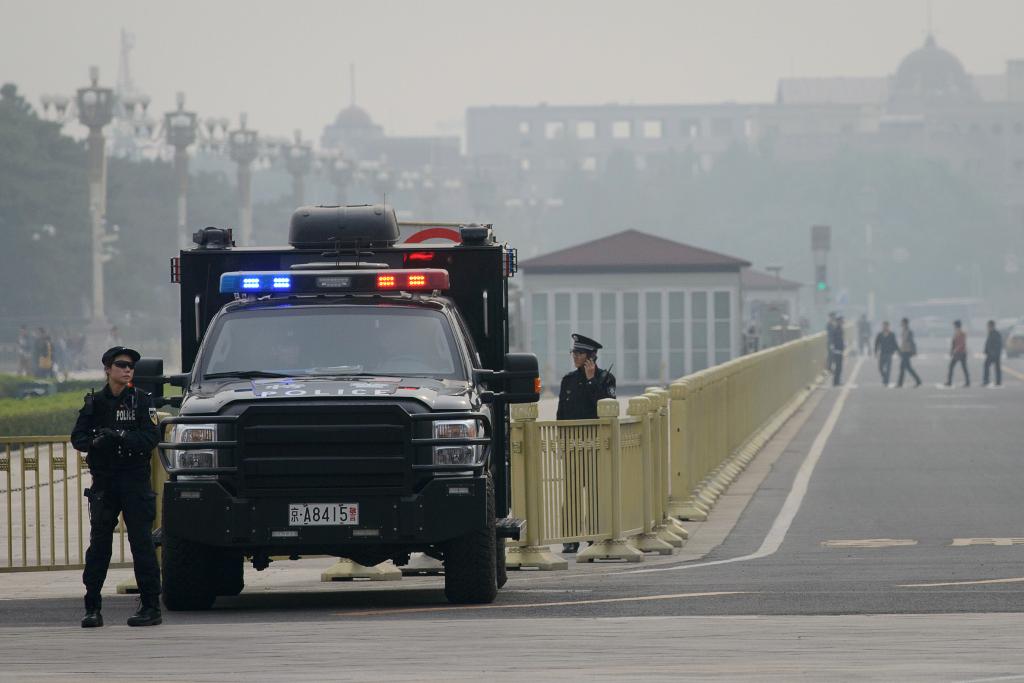China indicts 8 people over last year’s deadly Tiananmen Square attack
Armed police stand guard at Tiananmen Square in Beijing on Oct. 31, 2013.
Prosecutors in far western China have indicted eight people over an attack on the edge of Beijing's Tiananmen Square last October in which a car ploughed into a crowd and caught fire, the state-run Xinhua news agency reported on Saturday.
The government of the restive region of Xinjiang also unveiled new policies to underpin a year-long, nationwide anti-terrorism campaign launched on May 25, offering rewards for weapons turned in to the police and mandating that companies hire more locals.
The anti-terrorism drive has focused on Xinjiang, home to a large Muslim Uighur minority, following a series of bloody attacks that Beijing blames on Islamists and separatists from the region.
The Uighurs are culturally closer to ethnic groups across central Asia and Turkey than the Han Chinese who make up the vast majority of China's population.
The government blamed the Beijing attack on separatist militants from Xinjiang. Three people in the car and two bystanders were killed, and 40 people were injured.
The procuratorate of Urumqi, the capital of Xinjiang, accused the eight being indicted of "organizing, leading and participating (in) a terrorist group and endangering public security with dangerous method," Xinhua said.
Xinhua did not identify the eight. It said they would stand trial at the Urumqi Intermediate People's Court but did not give a date.
The Xinjiang police have started offering cash rewards for weapons and information on caches of weapons, Xinhua reported separately on Saturday.
Bullets will fetch five 5 yuan ($0.80) apiece, a kilogram (2.2 lbs) of dynamite will get 20 yuan, grenades and landmines are good for 100 yuan and people who give tips that prevent or break up an "explosives-related terrorist case" can be rewarded as much as 30,000 yuan, it said.
Hiring more locals
The government has traditionally taken a big stick approach toward Xinjiang-related unrest, but Chinese President Xi Jinping on Thursday pledged to alleviate poverty and improve ethnic unity in the region.
He said employment should be a priority. Analysts have long said economic marginalization of Xinjiang's Uighurs is one of the main causes of the violence.
Xinjiang announced a new regulation on Saturday mandating that locals make up no less than 70 percent of new hires at companies operating in the region, and would would set up a special development fund to support the goal, Xinhua reported.
A senior official with the regional branch of the government body that manages state-owned enterprises said minorities should make up 25 percent of employees, it said.
Since the Oct. 28 attack there have been several other attacks that the government has blamed on separatist militants from Xinjiang, the deadliest of which occurred on May 22 when, according to the government, five suicide bombers hit a market in Urumqi killing 39 people.
A few weeks earlier a bomb went off at a train station, killing one person and wounding 79.
Chinese authorities have blamed what they called the East Turkestan Islamic Movement (ETIM), a Muslim Uighur separatist group, for the Oct. 28 attack at the foot of the Forbidden City in Beijing.
(Reporting by John Ruwitch; Editing by Jeremy Laurence and Matt Driskill)
The story you just read is accessible and free to all because thousands of listeners and readers contribute to our nonprofit newsroom. We go deep to bring you the human-centered international reporting that you know you can trust. To do this work and to do it well, we rely on the support of our listeners. If you appreciated our coverage this year, if there was a story that made you pause or a song that moved you, would you consider making a gift to sustain our work through 2024 and beyond?
